The Egyptian regime was not satisfied with Sukuk and bonds, nor with direct borrowing, nor was it satisfied with its final step in approving green bonds to include among the debt instruments.
It also submitted the draft of the sovereign Sukuk law. The Senate finally approved the bill introduced by the government and referred it to the House of Representatives in preparation for its promulgation.
The bill paves the way for Egypt to enter the world of Islamic finance, as the Sukuk is a fixed income product, completely like traditional bonds, but without interest. In recent years, Egypt witnessed an acceleration in borrowing from abroad through several tools, which raised the external debt to $129.2 billion by the end of last December, according to official data.
In a previous statement, Minister of Finance Mohamed Maait said that the law is part of the ministry’s plan to diversify the investor base in government securities. The sovereign Sukuk is primarily issued in formats compatible with Islamic Sharia principles to attract a new segment of investors. Like Saudi Arabia, Malaysia, and Indonesia, the Egyptian move comes from issuing sovereign Sukuk to enable the government to obtain other forms of financing for the country’s public budget.
The executive regulations for the sovereign Sukuk law are likely to be issued after the bill is approved within three months. Sovereign Sukuk is issued in Egyptian pounds or foreign currencies through public or private offerings in the local or international markets. The Sukuk will be issued in the form of a paper or electronic certificate with the specifications specified by the government, and shall be of equal nominal value, and will be issued for a specific period in Egyptian pounds or foreign currencies through public or private offerings in the local or international markets. According to the draft law, the Sukuk proceeds are used to finance the state treasury to finance investment, economic, and development projects in the state’s economic and social development plan.
Hisham Ibrahim, professor of finance and investment at Cairo University, explains that sovereign Sukuk are in line with Islamic law principles, but “they cannot be called Islamic Sukuk; otherwise, there would be Christian, Jewish, and other Sukuk.” Ibrahim says that this Sukuk is not public financing, but the resulting funding is used for specific projects, which means that they are interest-free Sukuk, such as those found on bank loans. He adds, “It is also not an investment, due to the sizing of the level of profits. This is the idea of Sukuk, which is often used by the Arab Gulf countries and East Asia.”
Ibrahim believes that it is vital to enter this world as Sukuk is one of the financing mechanisms in the world, in addition to Egypt’s need for financial financing, because this stream may provide parts of the funding for some projects or the general budget. Moreover, some investment funds and banks are interested in this Sukuk. They can be attracted to the Egyptian market through sovereign Sukuk offerings. However, he indicates that this Sukuk will open a new door to the worsening debt in Egypt, but in one form and another.
Rashad Abdo, head of the Egyptian Forum for Economic Studies, explains that the goal of issuing sovereign Sukuk is to diversify the sources of financing the general budget and consider it as part of the financing for development projects and infrastructure implemented by the government. He says that during the past year, Egypt offered green bonds, which enabled it to raise $750 million to implement some development projects, especially since the state budget suffers from a deficit of EGP 438 billion. Egypt is the first country in Africa and the Middle East to issue green bonds of this value.
According to the World Bank, green bonds are debt instruments issued to obtain funds earmarked for financing projects related to climate or the environment. Abdo adds that the difference between treasury bills and bonds issued by the Ministry of Finance or the Central Bank and the sovereign Sukuk is that the latter is on the international external level. It is often aimed at collecting foreign currency, unlike bonds and treasury bills, which are at the internal level, often in Egyptian pounds.
According to the World Bank, Egypt’s external debt increased by 14.9 per cent in 2019 to $115.1 billion, compared to $100.1 billion in 2018. Egypt also became the largest borrower in the Middle East and North Africa region during 2020, accounting for nearly 34 per cent of the region’s total debt. The International Monetary Fund expects an increase in Egypt’s external debts to $126.7 billion by the end of the current fiscal year on June 30, 2021, and then to $127.3 billion at the end of June 2022. When Abdel Fattah Al-Sisi came to power in June 2014, Egypt’s debts amounted to only $46 billion. According to the Central Bank of Egypt, local debts rose to about EGP 4.18 trillion (about $266 billion), while it was about EGP 1.8 trillion when Sisi took over.
The expansion of borrowing has not been matched by a reduction in burden on citizens. Instead, the government expanded its plans to rationalise spending, reduce subsidies, impose more taxes and fees on citizens, and reduce salaries. It issued a law to decline one per cent of the basic wage of state workers and 0.5 per cent of pensioners. Also, the expansion of borrowing at high-interest rates made Egypt, according to the local economy, the enterprise bulletin, the most profitable for interest traders among emerging markets, with the introduction of Egyptian treasury tools to nearly double the risk-adjusted return, according to the same bulletin. According to IMF’s projections, there is an expansion in the current account deficit of Egypt, reaching 4.2 per cent of GDP in 2021, compared to a shortage of 3.2 per cent this year.





Recent Comments